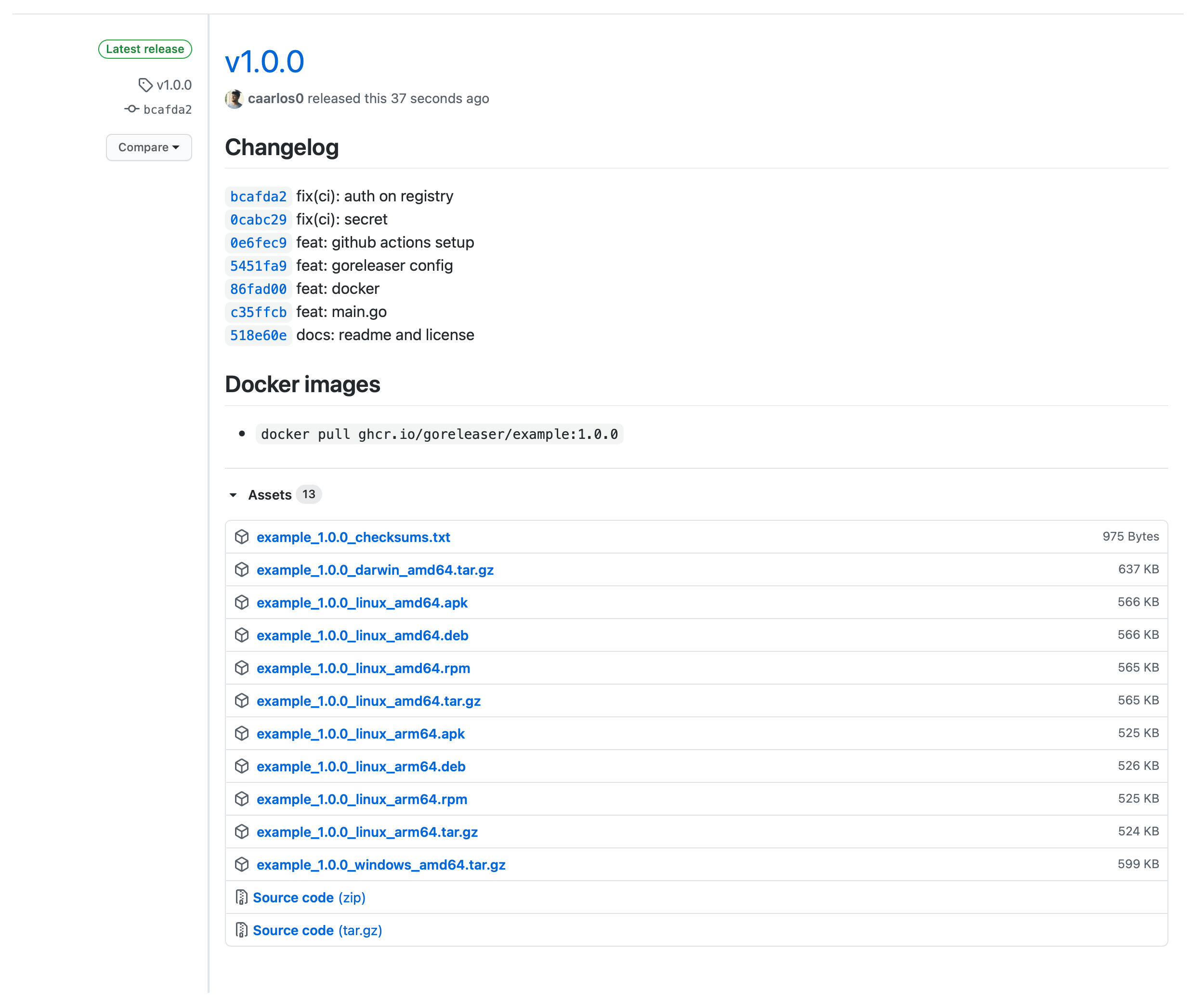GoReleaser can also be used within our official GoReleaser Action through GitHub Actions.
You can create a workflow for pushing your releases by putting YAML configuration to
.github/workflows/release.yml.
Below is a simple snippet to use this action in your workflow:
name: goreleaser
on:
push:
# run only against tags
tags:
- '*'
permissions:
contents: write
# packages: write
# issues: write
jobs:
goreleaser:
runs-on: ubuntu-latest
steps:
- uses: actions/checkout@v3
with:
fetch-depth: 0
- run: git fetch --force --tags
- uses: actions/setup-go@v3
with:
go-version: 1.19
cache: true
- uses: goreleaser/goreleaser-action@v2
with:
# either 'goreleaser' (default) or 'goreleaser-pro'
distribution: goreleaser
version: latest
args: release --rm-dist
env:
GITHUB_TOKEN: ${{ secrets.GITHUB_TOKEN }}
# Your GoReleaser Pro key, if you are using the 'goreleaser-pro' distribution
# GORELEASER_KEY: ${{ secrets.GORELEASER_KEY }}!!! warning "Some things to look closely..." #### The action does not install dependencies GoReleaser Action will not install any other software needed to release. It's the user's responsibility to install and configure Go, Docker, Syft, Cosign and any other tools the release might need.
#### Fetch depthness
Notice the `fetch-depth: 0` option on the `Checkout` workflow step.
It is required for GoReleaser to work properly.
Without that, GoReleaser might fail or behave incorrectly.
#### Tag fetching
Notice the `git fetch --force -tags`. This is needed if you use fields like
`TagBody`, `TagSubject` or `TagContents` in your templates.
For more information, take a look at
[actions/checkout#290](https://github.com/actions/checkout/issues/290).
#### Caching go dependencies
When using the `setup-go` action, you can optionally set `cache: true` for
it to aumatically cache and restore your go dependencies, which usually
helps speed up build times.
!!! tip For detailed instructions please follow GitHub Actions workflow syntax.
If signing is enabled in your GoReleaser configuration, you can use the Import GPG GitHub Action along with this one:
-
name: Import GPG key
id: import_gpg
uses: crazy-max/ghaction-import-gpg@v4
with:
gpg_private_key: ${{ secrets.GPG_PRIVATE_KEY }}
passphrase: ${{ secrets.PASSPHRASE }}
-
name: Run GoReleaser
uses: goreleaser/goreleaser-action@v2
with:
version: latest
args: release --rm-dist
env:
GITHUB_TOKEN: ${{ secrets.GITHUB_TOKEN }}
GPG_FINGERPRINT: ${{ steps.import_gpg.outputs.fingerprint }}And reference the fingerprint in your signing configuration using the GPG_FINGERPRINT environment variable:
signs:
- artifacts: checksum
args: ["--batch", "-u", "{{ .Env.GPG_FINGERPRINT }}", "--output", "${signature}", "--detach-sign", "${artifact}"]Following inputs can be used as step.with keys
| Name | Type | Default | Description |
|---|---|---|---|
distribution |
String | goreleaser |
GoReleaser distribution, either goreleaser or goreleaser-pro |
version1 |
String | latest |
GoReleaser version |
args |
String | Arguments to pass to GoReleaser | |
workdir |
String | . |
Working directory (below repository root) |
install-only |
Bool | false |
Just install GoReleaser |
Following outputs are available
| Name | Type | Description |
|---|---|---|
artifacts |
JSON | Build result artifacts |
metadata |
JSON | Build result metadata |
Following environment variables can be used as step.env keys
| Name | Description |
|---|---|
GITHUB_TOKEN |
GITHUB_TOKEN as provided by secrets |
GORELEASER_KEY |
Your GoReleaser Pro License Key, in case you are using the goreleaser-pro distribution |
The following permissions are required by GoReleaser:
contents: writeif you wish to- upload archives as GitHub Releases, or
- publish to Homebrew, or Scoop (assuming it's part of the same repository)
- or just
contents: readif you don't need any of the above packages: writeif you push Docker images to GitHubissues: writeif you use milestone closing capability
GITHUB_TOKEN permissions are limited to the repository that contains your workflow.
If you need to push the homebrew tap to another repository, you must create a custom
Personal Access Token with repo permissions and add it as a secret in the repository. If you
create a secret named GH_PAT, the step will look like this:
-
name: Run GoReleaser
uses: goreleaser/goreleaser-action@v2
with:
version: latest
args: release --rm-dist
env:
GITHUB_TOKEN: ${{ secrets.GH_PAT }}You can also read the GitHub documentation about it.
You can check this example repository for a real world example.
 Example release on GitHub.
Example release on GitHub.
Footnotes
-
Can be a fixed version like
v0.117.0or a max satisfying SemVer one like~> 0.132. In this case this will returnv0.132.1. ↩